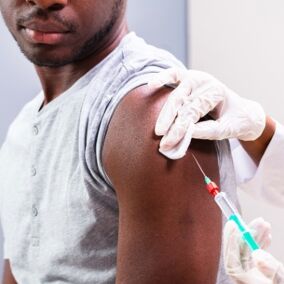
After skin cancer, prostate cancer is the second most common form of cancer in men. Around one in eight men will develop the disease at some stage in their life. One in 41 men will die from it.
Prostate cancer can be very slow growing. Some men can live with it for years before treatment is necessary. However, if there’s a risk the cancer may spread, your oncologist may recommend a prostatectomy. This is the partial or full removal of the prostate gland.
The operation is not without its risks. Any removal of the prostate can sometimes lead to nerve damage impacting erectile function. There can be incontinence and a drop in libido. What’s less talked about is the impact of losing one’s prostate if one enjoys receptive anal sex.
A Ph.D. researcher wants to speak to gay men with prostate cancer about this very topic.
Jéaux Rinedahl is a registered nurse who has specialized in oncology. He’s currently undertaking a Ph.D. at Walden University. His study is entitled, ‘Quality of Life from a Prostatectomy in Men Who Have Sex with Men’.
Anyone who has been diagnosed, and who is gay or bi, can apply to take part. The anonymous study takes the form of an online survey that should just take a few minutes of your time.
“I thought he was being a drama queen”
Rinedahl told Queerty when he wanted to undertake the study.
“One day, in a conversation with a group of men, a friend of a friend with whom I was not acquainted, made a statement out of the blue,” Rinedahl recalled. “He said, ‘I had prostate cancer, and now after my surgery, I am no longer a gay man, or even a man anymore. My sex life is over.’
“I was shocked and stunned by this statement. He was a 55-year-old physician, handsome, and surely a catch for any man. Here I was, a chemotherapy and oncology nurse – and a gay man – and I had no idea what he was talking about. I thought he was being a drama queen.
Rinedahl sought out data regarding the impact of prostatectomy. He found studies relating to gay and bi men lacking.
“The results were several studies on sexual dysfunction; however, the participants were men who have sex with women (MSW). I was only able to find 4 qualitative articles on sexual dysfunction in the MSM population, mostly 10 years old, and with only a couple of participants.
“One study however, The Restore Study of 2016 by Dr Rosser, was a large qualitative study that addressed prostate cancer in the MSM population. From these studies, I learned that my friend’s friend was experiencing what many men had as well. I did not know about the effects of a prostatectomy on the quality of life from the sexual dysfunction, primarily because prostate cancer patients are frequently seen by a urologist, rather than an oncologist. I felt embarrassed and ashamed that this was happening in my own community, and I was not aware. Shame on me for being so ignorant.”
Rinedah wants to hear from gay men who have received a prostate cancer diagnosis, whether they have had their prostate removed or not. This is so he can compare their experiences.
Bottoms don’t flip after prostate removal
So does a prostatectomy impact the ability to get f*cked?
“There is little data on this officially, however between the literature, and my conversations with many men about this subject over the past three years, it indeed does impact one’s ability to have receptive anal sex,” he says.
“Initially, it is due to the surgical removal through the anus, which takes months to recover, under standard conditions. Some men report a loss of sensation in the area, and some men become fearful of receptive anal intercourse because of the surgery.
“In heterosexual men, the prostate is a reproductive organ. In gay and bisexual men, it is a sexual organ. Since the prostate is anatomically present during anal intercourse, and generates great pleasure in many men, however, when removed, there is a void of space inside, and the sexual stimulation of thrusting against the prostate is gone.”
He says surgery doesn’t prompt some bottoms to necessarily flip position.
“If a bottom recovers physically from the surgery, it is physically possible to return to anal receptive intercourse, however, very few do. Something I discovered in my research that I was surprised to find, is that most MSM who are either a top or a bottom, cannot (for many reasons) ‘flip’ to the other role. I thought that versatility in our community would be one of the resolutions to this issue, however, I have found that the contrary is true. Men evidentially do not switch positions.”
If you think you might be able to help Rinedahl with his research, check it out here or email him: [email protected]
What are the signs of prostate cancer?
Prostate cancer is very rare in men under 40. The average age of those diagnosed is 66. It can impact all men but Black men are known to be more at risk. Earlier today, British actor Colin McFarlane, 61 (The Dark Knight), publicly revealed his diagnosis and urged men over 45 to get tested.
Early signs can include any of the following:
- Problems urinating, including a slow or weak urinary stream or the need to urinate more often, especially at night
- Blood in the urine or semen
- Trouble getting an erection (erectile dysfunction or ED)
- Pain in the hips, back (spine), chest (ribs), or other areas from cancer that has spread to bones
Do speak to a doctor if you have any concerns. Here’s an informative video posted this week by a gay urologist about the impact of a prostate cancer diagnosis on gay men. Trans women and non-binary individuals who have prostate glands are affected by many of the same issues.
Related*


What is DoxyPEP and should more queer men use it to protect their health?
Have you heard about DoxyPEP?


Let’s explore the wonderful world of sex toys for men
Whether you’re a seasoned pleasure pro or just getting started with toys, there’s a world of sensation waiting to be explored.











































Kangol2
A great discussion of a challenge many men of all races and backgrounds may face, and it’s important that this article is focusing on gay and bi men with prostates and the need for more studies focused specifically on gay and bi men who’ve received prostate removals or surgeries.
Fahd
It is nice that Queerty is trying to help reserach focused on gay men’s issues, but I’d advise people to learn more about the researcher, the university, and the purpose and nature of the study before participating. If it’s a Ph.D. study it should be more complicated than describing the “quality of life” of gay men who’ve had their prostrates removed. What is the study design? Has the University Research Board approved the study? What are the hypotheses?
Not sure what kind of personal data is sought, but people should be careful about giving a lot of personal information to a researcher they don’t know in an online survey – the article’s direct link to the survey isn’t a good idea, in my opinion.